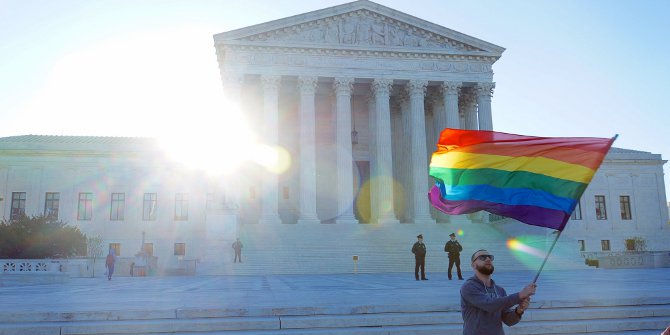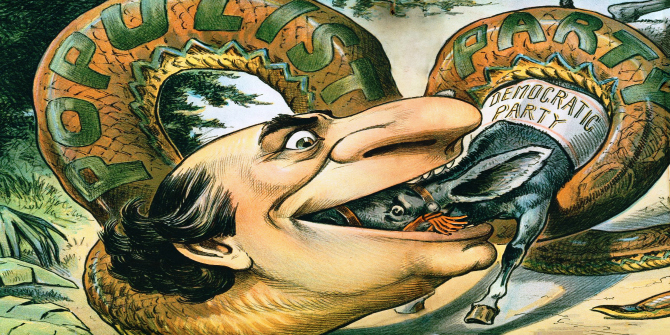 In almost all US states, voters are required to register to vote ahead of actually casting their ballot. In new research focusing on voter registration in Florida, Thessalia Merivaki finds that both how and where people register to vote is important. Those who registered to vote in rural counties, she writes, as well as in the June and February preceding the registration deadline, were more likely to have their registrations rejected.
In almost all US states, voters are required to register to vote ahead of actually casting their ballot. In new research focusing on voter registration in Florida, Thessalia Merivaki finds that both how and where people register to vote is important. Those who registered to vote in rural counties, she writes, as well as in the June and February preceding the registration deadline, were more likely to have their registrations rejected.
Not all Americans who attempt to register to vote will be able to cast a valid vote on Election Day because their registration application will have been deemed to be invalid. Many things can go wrong in the process of voter registration that can result in a rejected application. A voter may fill the form in haste when offered to register to vote outside a shopping mall by an advocacy group, which is responsible of submitting it on behalf of the voter. Or they may mistype their address on the form, and the local election official is not able to correct it in time.
Non-citizens cannot vote, so their voter registration will be automatically denied. Citizens who have committed a disenfranchising crime also cannot vote, and therefore they will also be denied registration. However, voter registration applications submitted from eligible voters may also be invalidated due to administrative errors, errors in completing the form, or because the application is not submitted on time. If a prospective voter’s registration is invalidated, her name will not appear in the voter registry, and she will not be able to cast a valid vote.
In the United States, prospective voters are required to register to vote before they cast their vote on Election Day. Although this requirement exists in all states but North Dakota, the requirements for voter registration vary depending on where one resides. Voters in Wisconsin, for example, can show up at the polls on Election Day, register to vote, and cast their ballot on the same day. Voters in Florida, however, have to register to vote 29 days before Election Day. This window of time allows for local election officials to verify the voter’s information and ensure that the voter registry is accurate and ready to use on Election Day.
Because voter registration is complex and often considered a barrier to political participation, Congress adopted the National Voter Registration Act in 1993 and increased the options for prospective voters to register to vote. Except from five states who allow for voters to register to vote on Election Day, citizens in forty-four states and the District of Columbia are offered voter registration when they apply for a driver’s license, welfare benefits, when they check out a book at a public library, or when they are approached by advocacy groups. They also can mail their voter registration application to their local election office, or submit it in-person.
How and when one registers to vote matters
Local election officials are responsible for processing and verifying voter registration applications and managing voter registration records. Because voters are interested and/or encouraged to register to vote closer to Election Day, the flow of registration applications varies dramatically over time, with notable increases the final weeks before an election. In states like Florida, where the voter registration deadline is 29 days prior to the General Election, voters have a limited window to register to vote, and an even shorter window to successfully do so if their application is submitted with incomplete or missing information. On top of the variation in when prospective voters will attempt to register to vote comes how they will do it: as Figure 1 shows, in Florida, the method of voter registration submission varied in the months preceding the November 2012 Presidential Election.
Figure 1 – Percentage of Voter Registration Application Submissions in Florida in 2012
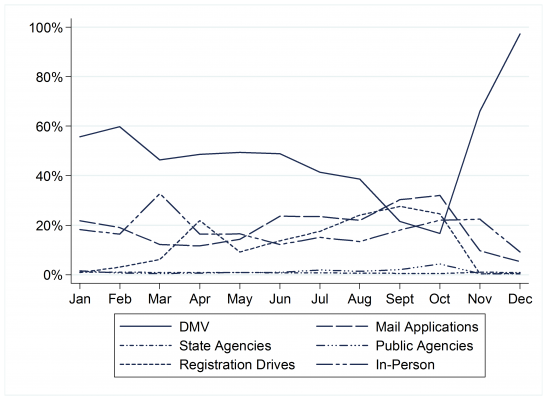
Most Floridians applied for voter registration when receiving or updating their driver’s licenses (DMV), but that number slowly decreased over time. Third-party voter registration drives, which are very active in Florida, increased their mobilization about four months before the November 9, 2012 voter registration deadline, and so did applications that were submitted in-person and by mail. Across Florida, the average voter registration rejection rate was 11 percent, which is low compared to the number of applications accepted as valid. However, rejection rates reached 25 percent in March of 2012, and decreased to 5 percent in October. What is more, some localities rejected more applications than others between January and December of 2012, as Figure 2 shows.
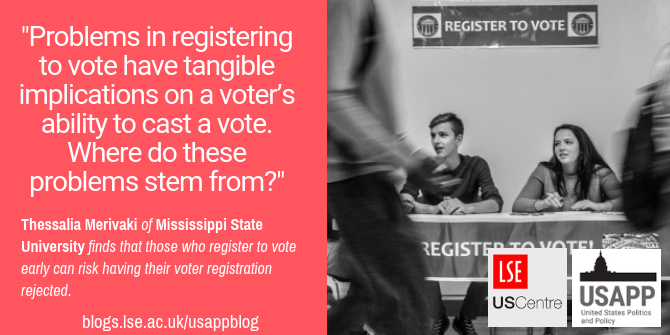
“National Voter Registration Day” by Phil Roeder is licensed under CC BY 2.0
It is plausible that more voter registration applications are rejected in densely populated jurisdictions due to the high number of prospective voters interested in registering to vote. As Figure 2 shows, however, some rural counties in Florida rejected more registrations on average between January and December of 2012. This suggests that how and when one attempts to register to vote may impact the chances that a voter registration application will be successfully processed.
Figure 2 – Percentage of Rejected Voter Registrations in Florida in 2012
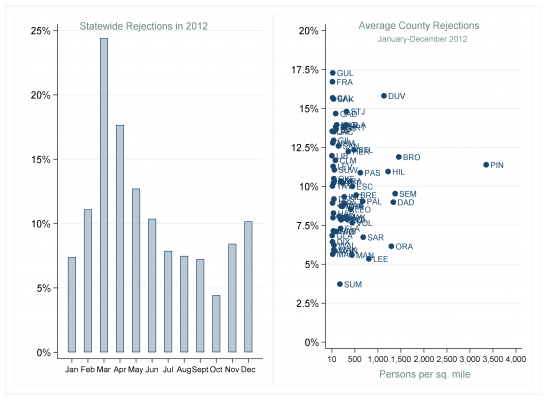
Which factors explain voter registration rejections in Florida?
Are some methods of voter registration more prone to rejection? Or are there seasonal effects depending on when a prospective voter registers to vote? Do counties and regions systematically differ in how they process voter registration applications regardless of when and where they were submitted? At least insofar as the 2012 election year is concerned, it appears so. Applications submitted by mail and through state agencies, such as disability offices and public assistance offices, reduce the overall rejection rates in a local jurisdiction, when controlling for timing of voter registration, local jurisdiction density, and partisanship of the local election officials.
Compared to September, the final month before Florida’s November 9, 2012 voter registration deadline, applying to register to vote in October reduced the overall rejection rates in a locality, when all other factors are held constant. However, the rates of rejected registrations increased in February and June. This is important, as the flow of voter registration is significantly lower during these months compared to September and October.
Modernizing voter registration and the impact on rejections
Problems in registering to vote have tangible implications on a voter’s ability to cast a vote. Where do these problems stem from, however? Do voters submit incomplete applications too late in the election cycle, which cannot be processed? Are voters more likely to make errors when registering to vote depending on how the choose to register? Are local election officials able to use their discretion when processing registrations? These are important questions that require different solutions insofar as minimizing errors in voter registration.
It is difficult to control when Americans will register to vote. Supporters of voter registration reform argue that reforms such as Online or Automatic Voter Registration argue that Online Voter Registration will decrease errors in voter registration applications, and that Election Registration will remove the burden on voters and election officials from late applications. Still, challenges in verifying voter registrations remain, which can exclude eligible citizens from the voting process. Whose application is rejected and why becomes, therefore, key in the study of voter registration reform.
- This article is based on the paper, ‘Access Denied? Investigating Voter Registration Rejections in Florida’ in State Politics and Policy Quarterly.
Please read our comments policy before commenting.
Note: This article gives the views of the author, and not the position of USAPP – American Politics and Policy, nor of the London School of Economics.
Shortened URL for this post: http://bit.ly/2EzONlf
About the author
 Thessalia Merivaki – Mississippi State University
Thessalia Merivaki – Mississippi State University
Thessalia Merivaki is an assistant professor of political science at Mississippi State University. Her research focuses on the systematic study of election administration and reforms and the impact on voters, which is part of the growing field of Election Sciences. Her forthcoming book, “The Administration of Voter Registration: Patterns and Variation Across the States,” addresses the structural and administrative challenges in voter registration and how they condition voters’ access on Election Day.



